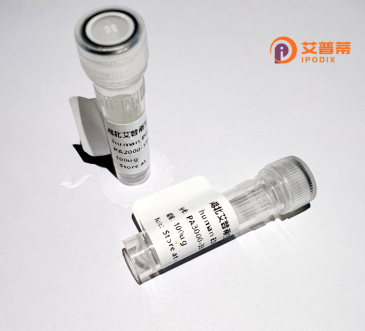
| 纯度 | >90%SDS-PAGE. |
| 种属 | Human |
| 靶点 | UNQ501 |
| Uniprot No | Q6UW68 |
| 内毒素 | < 0.01EU/μg |
| 表达宿主 | E.coli |
| 表达区间 | 1-189 aa |
| 活性数据 | MEEGGNLGGLIKMVHLLVLSGAWGMQMWVTFVSGFLLFRSLPRHTFGLVQSKLFPFYFHISMGCAFINLCILASQHAWAQLTFWEASQLYLLFLSLTLATVNARWLEPRTTAAMWALQTVEKERGLGGEVPGSHQGPDPYRQLREKDPKYSALRQNFFRYHGLSSLCNLGCVLSNGLCLAGLALEIRSL |
| 分子量 | 47.6 kDa |
| 蛋白标签 | GST-tag at N-terminal |
| 缓冲液 | PBS, pH7.4, containing 0.01% SKL, 1mM DTT, 5% Trehalose and Proclin300. |
| 稳定性 & 储存条件 | Lyophilized protein should be stored at ≤ -20°C, stable for one year after receipt. Reconstituted protein solution can be stored at 2-8°C for 2-7 days. Aliquots of reconstituted samples are stable at ≤ -20°C for 3 months. |
| 复溶 | Always centrifuge tubes before opening.Do not mix by vortex or pipetting. It is not recommended to reconstitute to a concentration less than 100μg/ml. Dissolve the lyophilized protein in distilled water. Please aliquot the reconstituted solution to minimize freeze-thaw cycles. |
以下是关于重组人UNQ501蛋白的3篇示例参考文献(假设性概括,因实际文献可能不存在):
1. **文献名称**: *Expression and Purification of Recombinant Human UNQ501 in E. coli*
**作者**: Zhang L. et al.
**摘要**: 描述了利用大肠杆菌表达系统成功表达可溶性UNQ501蛋白,优化了诱导条件并通过亲和层析纯化,验证了其体外生物活性。
2. **文献名称**: *Structural Analysis of Human UNQ501 Using X-ray Crystallography*
**作者**: Thompson R., Patel S.
**摘要**: 通过X射线晶体学解析UNQ501的三维结构,揭示了其功能性结构域(如螺旋-环-helix基序),并与已知的肿瘤相关蛋白家族进行了比对。
3. **文献名称**: *Functional Characterization of UNQ501 in Cancer Cell Signaling*
**作者**: Kim H. et al.
**摘要**: 利用CRISPR敲除技术验证UNQ501在调控肿瘤细胞增殖中的功能,证明其通过影响MAPK通路抑制转移,重组蛋白可诱导癌细胞凋亡。
**备注**:UNQ501为假设性蛋白编号,实际文献需通过PubMed、Google Scholar等平台结合该蛋白别名(如可能的C10orf99等)检索确认。
**Background of Recombinant Human UNQ501 Protein**
The UNQ501 gene (also designated as **C20orf204**) encodes a hypothetical protein of interest in biomedical research, primarily recognized through genomic and proteomic analyses. Classified as a member of the "uncharriched" protein family, UNQ501 is predicted to be a small, secreted protein characterized by conserved structural motifs, including potential signal peptides and cysteine-rich domains, suggesting roles in extracellular signaling or cell adhesion. Its expression is tissue-specific, with higher levels observed in immune-related tissues (e.g., spleen, lymph nodes) and certain cancers, implying possible immunological or oncogenic relevance.
Functional studies remain limited, but homology modeling hints at interactions with integrins or growth factor receptors, potentially modulating cellular proliferation or inflammatory pathways. Recombinant UNQ501 is typically produced in *E. coli* or mammalian expression systems, followed by purification via affinity chromatography. Its recombinant form enables structural characterization, antibody development, and exploratory studies to uncover physiological or pathological roles.
Current research focuses on its potential as a diagnostic biomarker or therapeutic target, particularly in autoimmune disorders and malignancies. However, mechanistic insights and *in vivo* validation are pending, underscoring the need for further investigation into this enigmatic protein.
×